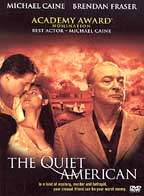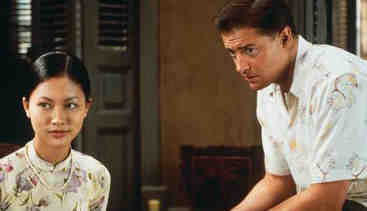The Quiet American
(Certificate 15) VHS and DVD
Michael Caine, Brendan Fraser, Do Thi Hai Yen. Director: Philip Noyce.
MICHAEL CAINE has been in some dreadful films in his long career – remember The Swarm? That said, given the right film, he can be a terrific actor and, believe me, this is the right film.
The story is narrated by Thomas Fowler (Caine), a cynical veteran correspondent for The Times in 195os Saigon. France is waging a colonial war against the communist Vietminh.
A body is found in the river as the film opens. Fowler identifies him to a French police officer as Alden Pyle (Brendan Fraser), "A quiet American. Not like those noisy bastards at the Intercontinental Hotel." He has been stabbed and thrown into the river.
Fowler recalls how he first met Pyle and how a triangular relationship developed with his mistress, the beautiful Phuong (Do Thi Hai Yen). Pyle arrives in Saigon as a part of the American ‘Economic Aid Mission’. Everyone knows that France is losing the war. Bombs are going off everywhere and there is news of a new communist offensive in the North. As Pyle puts it, "No. We’re not colonialists. We want to help."
In the meantime, Fowler receives a cable from
London recalling him home. Fowler doesn’t want to leave Phuong and he can’t
bring her back. His wife back in England is a strict Catholic who will not give
him a divorce. His aide is puzzled, "I thought you liked London."
Fowler, "I like it just where it is. I don’t want to bloody go
there." He stalls the office off with news of a story developing in the
North and heads off in search of one.
He reaches a village which has been the scene of a massacre. Both the French and the Vietminh deny responsibility. Pyle turns up too, and under artillery bombardment confesses his love for Phuong. He wants to marry her and take her back to Boston. This path is not open to Fowler. Caine’s portrayal of Fowler’s anguish is outstanding. Fowler makes a pathetic attempt to deceive Phuong and Pyle that his wife will agree to a divorce. It fails when the letter is discovered and read by Phuong’s sister. Phuong moves out and goes to live with Pyle. Fraser too shows a stronger side to his acting ability after comedies like Bedazzled and brainless blockbusters like The Mummy.
My granny always said that it’s the quiet ones you ought to watch and so it turns out with Pyle. Pyle turns out to be much more than just an economic aid advisor. Fowler discovers that he is supporting a third force led by the charismatic General Thé and a sinister businessman called Muoi. He finds out that the Americans are arming the general, whose forces were responsible for the Northern massacre. This has tragic consequences for Pyle when he is confronted with the bloody cost of his ‘aid’.
The underlying political message of this film is still apparent today. Indeed, change the scenery and the same things are probably still happening today. It’s no wonder that its release was delayed in the United States for a year or more as few folk there were in the mood to examine the costs and consequences of increased overseas military intervention after their country was attacked on September 11th 2001. In fact, its release is timelier as the US intervenes in more and more countries across the globe. The Vietnam debacle began with ‘economic aid’ and ended with the loss of all those young men whose names are inscribed on a stark black granite wall in Washington DC. Pyle wanted to help but his ‘help’ did more harm than good to Vietnam and to America too.
David Kerr